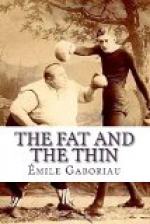INTRODUCTION
“The fat and the thin,” or, to use the French title, “Le Ventre de Paris,” is a story of life in and around those vast Central Markets which form a distinctive feature of modern Paris. Even the reader who has never crossed the Channel must have heard of the Parisian Halles, for much has been written about them, not only in English books on the French metropolis, but also in English newspapers, magazines, and reviews; so that few, I fancy, will commence the perusal of the present volume without having, at all events, some knowledge of its subject matter.
The Paris markets form such a world of their own, and teem at certain hours of the day and night with such exuberance of life, that it was only natural they should attract the attention of a novelist like M. Zola, who, to use his own words, delights “in any subject in which vast masses of people can be shown in motion.” Mr. Sherard tells us[*] that the idea of “Le Ventre de Paris” first occurred to M. Zola in 1872, when he used continually to take his friend Paul Alexis for a ramble through the Halles. I have in my possession, however, an article written by M. Zola some five or six years before that time, and in this one can already detect the germ of the present work; just as the motif of another of M. Zola’s novels, “La Joie de Vivre,” can be traced to a short story written for a Russian review.
[*] Emile Zola: a Biographical and Critical Study, by Robert Harborough Sherard, pp. 103, 104. London, Chatto & Windus, 1893.
Similar instances are frequently to be found in the writings of English as well as French novelists, and are, of course, easily explained. A young man unknown to fame, and unable to procure the publication of a long novel, often contents himself with embodying some particular idea in a short sketch or story, which finds its way into one or another periodical, where it lies buried and forgotten by everybody—excepting its author. Time goes by, however, the writer achieves some measure of success, and one day it occurs to him to elaborate and perfect that old idea of his, only a faint apercu of which, for lack of opportunity, he had been able to give in the past. With a little research, no doubt, an interesting essay might be written on these literary resuscitations; but if one except certain novelists who are so deficient in ideas that they continue writing and rewriting the same story throughout their lives, it will, I think, be generally found that the revivals in question are due to some such reason as that given above.




